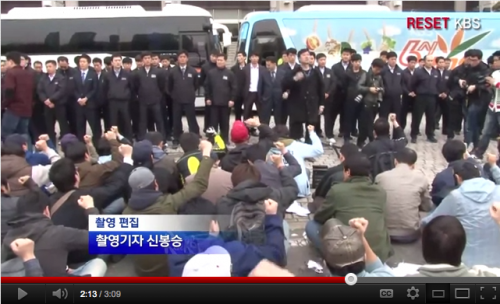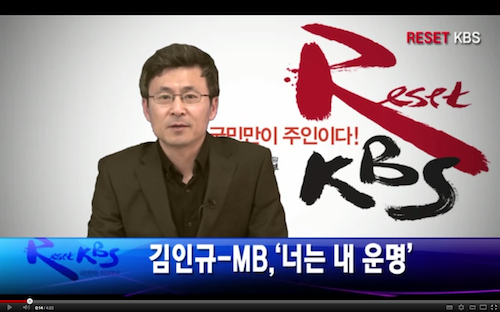Massive Media Strike in South Korea
by Olivia Stransky / April 25, 2012 / 2 Comments
Since March 6 the Media Workers Union of KBS (Korean Broadcasting System) has been on strike in the hope of drawing attention to pro-government bias in KBS’s news coverage. The KBS union is joined by unions from MBC (Munhwa Broadcasting Corporation) and YTN (Yonhap Television News). Strike members are demanding the resignation of the company’s president, Inkyu Kim, who was appointed president after his participation in Myung-bak Lee’s successful presidential campaign. Journalists on strike say that the heads of the networks have imposed a bias in support of the president of South Korea.
Sampsonia Way contacted a member of the Media Workers Union of KBS to get some answers about the state of free journalism in South Korea. Because KBS has been imposing punitive actions against employees who discuss the strike with outside media, our contact requested that his name be withheld. Instead, with the approval of the union, the answers below are attributed to the Media Workers Union as a whole. The interview was conducted via email, and the Union’s answers were translated by Seung-Hwan Shin.
How did these protests start? Why now?
The Media Workers Union of KBS (Korean Broadcasting System, the biggest TV station in Korea) started this strike on March 6th. Currently about twelve hundred union members are participating in the strike. As of April 10 we have been on strike for more than a month and half, which is the longest strike in the history of the KBS labor union.
The driving force of this strike is a widely shared sense that the government interventions into major journalism institutes, which have been continued since the beginning of the current administration, have reached an intolerable level.
MBC (Munhwa Broadcasting Corporation; the second largest TV station in South Korea) has also been on strike since late January, and other institutes such as YTN and Associated Press also joined the wave of journalist strikes to restore freedom of the press.
This is the first time in the history of South Korean democracy that major journalism institutes have organized a massive strike in unison against the government’s suppressive journalism policies.
What are the demands being made by those on strike?
We are focused on three requests. First of all, we demand a withdrawal of unjust punitive measures imposed on union executive members. Thirteen former executive members were unfairly penalized for refusing to follow the government’s unreasonable and suppressive press policies. Nobody has yet been fired for being critical of the government policies in KBS, but more than ten have already lost their jobs in MBC and YTN. Secondly, we also fight to restore the fairness and justice in South Korean journalism. Lastly, in order to do so, it is inevitable that incumbent President of KBS, Inkyu Kim, must step down. It is President Kim above all others that degraded KBS, the largest public broadcasting company, into a means to advertise and promote government propaganda; without his resignation, it would be impossible for KBS to carry out its duty to speak the truth to the South Korean public.
President Kim worked as a media secretary for Myung-bak Lee (the incumbent President of South Korea) during his presidential campaign. After winning the presidency, President Lee appointed Kim as KBS’s president, and in order to do so he overrode various required legal procedures. After Mr. Kim took over the executive power of KBS, he set out to turn the voice of KBS—particularly those of political/news shows—pro-government by force. By abusing the power of the chief editorial board, he ruthlessly cut programs and news episodes that were critical of the government. He responded to dissident union members with severe punitive actions including relegating them to minor positions.
Thus, we came to the conclusion that the first step to a restoration of our autonomy from the suppressive government should be the resignation of President Kim.
Yet KBS and the government have accepted none of our request thus far. We will continue our strike until our demands are accepted.
Anchorman Choi Il-gu of MBC has said that freedom of press in South Korea now is as bad or worse than it was in 1987. Do you think this is an accurate comparison?
It is quite shameful to say this, but Anchorman Choi’s observation is quite true. As mentioned above, from the outset the Lee administration has continued to encroach on the freedom of journalism by force. In brief, we are witnessing what would have only been possible in a despotic regime as was the case with the 1970s and the 1980s. They have been trying to put the media under their control by planting President Lee’s close allies in high-profile positions in major media organizations including KBS. Their main job was suppressing critical voices in political shows and other programs and filling them with pro-government policies and ideologies.
In the case of KBS, for instance, a news episode critical of the current administration was banned from being aired by the chief editorial board; several major political shows such as Political Project Ssam (sisakihoik ssam) and Politics Tonight (sisa tunait) have been canceled; bans and regulations have been enforced on the invitation of political figures and celebrities affiliated with oppositional parties and civil organizations to TV programs; an investigation into the Four Rivers Development Project was prohibited from being aired; severe punitive actions were taken towards producers of programs critical of the government (both from KBS and Korea Communications Commissions, a state agency); individuals who have spoken out against restrictive decisions have been demoted or transferred; and there have been excessive advertisements of key policies of the current administration (G20, the Cheonan ship incident, the nuclear security summit, and so on).
The examples listed above would happen before 1987, that is, under military rule before the achievement of democratization in 1987. Unfortunately, however, over the past four years or so, such things have once again become routine in Korean society.
As we have recently revealed on “Reset” (an alternative Podcast news show produced by the KBS labor union), the Lee administration has spied closely on media companies and gotten deeply involved in appointing pro-Lee figures to key positions in those institutions.
KBS is largely state-owned. Do you think the government has had direct involvement in biasing news in favor of the president?
Simply put, yes. First of all, the way in which the presidents in major media companies are appointed should be put into question. In KBS’s case, the chief executive board selects a candidate and then recommends him/her to the president. Then the president approves/disapproves the candidate. The problem is, however, that the president and his ruling party have the right to decide 6 out of 9 members in the chief executive board. In other words, this rule gives the president almost exclusive power to determine who should be the head of KBS.
Since democratization, it has never been the case that someone from the campaign team of the newly elected president is appointed to the head of KBS. Inkyu Kim was the first. It was the beginning of a big wave of purging. After he seized executive power, he started filling key administrative positions with pro-government figures and alienated those with different ideas from influential positions. He has abused his power over human resources to oppress journalists and prevent critical voices from reaching the eyes and ears of the public. Accordingly, our ultimate goal is not simply making President Kim step down but more importantly bringing change to the way in which the president is selected and appointed. The systems in MBC and YTN have little difference in presidential appointment.
Celebration for (Future) Resignations of the presidents of MBC, KBS, and YTN
Can you describe how broadcast news has changed since the strike?
With main production forces involved in the strike for more than a month, a good number of programs are facing difficulties operating in full capacity. Major programs such as Inquiry 60 Minutes, Consumer Reports, History Special, and 1 Night/2 Days are currently off the broadcast schedule.
As for the news shows, positions held by union members on strike were filled with non-union members and administrative personnel to continue airing them. As a consequence, the contents of the news shows have recently become more pro-government. With the general election coming up (April 11th), their editing directions have also turned more explicitly favorable to the ruling party.
In response to the situation, we launched a Podcast news channel, Reset KBS, named in the hope of literally “resetting KBS,” which is broadcast once a week. It has generated a lot of attention in South Korean society. Particularly, the exclusive report on the government’s espionage on numerous civilians garnered great attention from the public. Although on strike and unable to be in full strength, we are making all possible efforts to show to the public an example of upright journalism.
Are any radio or print media outlets participating in the strike? Are these sectors affected by (supposed) government influence to the degree that TV news is?
Yes. For instance, the Associated Press, the biggest news agency in South Korea. Its president was also appointed by the Lee administration, which, as was the case with other media institutes, eventually led to a strike. Many other broadcasting stations and newspaper companies, although not on strike for themselves, have been very supportive of strike participants in KBS, MBC and YTN. Generally speaking, at the center of the massive journalist strikes are the media institutions whose presidents were installed by the current administration.
What has the public response been to the media strike? Is there a lot of citizen support for the journalists?
Citizen support for our strikes have been quite stunning and explosive. A large number of citizens have been raising funds for our strikes and sending strike participants encouraging messages through SNS and the Internet. Furthermore our podcast news show Reset KBS is also successful in attracting great attention from the public; currently it ranks first.
If the news channels refuse to accept the terms of the strikes, what kind of solution, if any, do you think can be reached?
We, journalists on strike, will not give up our fight unless our companies and the Lee administration accept our demands. When the Congress is reconfigured after the upcoming general election (April 11th), we will also request that Congress initiates a national investigation into or a public hearing on the present administration’s authoritarian control over South Korean media.







2 Comments on "Massive Media Strike in South Korea"
Trackbacks for this post